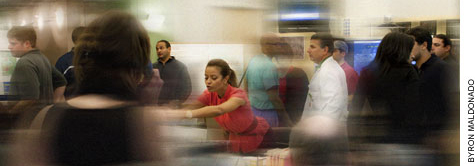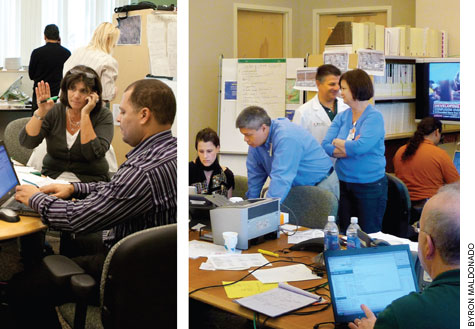 |
 |
Ultimate Outreach
By Dwayne Campbell
 |
| Working from a command center at the Miller School in Miami, UM’s Haiti Relief Task Force clocks up multiple miracles. |
They were many miles from the disaster zone—but very much a part of the UM Global Institute and Project Medishare postearthquake efforts to treat as many survivors as possible. These doctors, administrators, and other Miller School employees in Miami, along with outside volunteers, placed their daily responsibilities on hold to play an integral role in saving lives.
The team started small just a day after the January 12 earthquake, but by the end of the week the impromptu headquarters that became known as the Haiti Relief Task Force command center was home to more than two dozen people taking on sometimes-unfamiliar tasks. Separated by many miles and much heartache, the UM medical team in Haiti and the Miami task force helped each other perform miracles large and small.
In Miami, the task force filled a warehouse until it was overflowing with medical supplies, wrangled private jets from devoted donors, pressed government officials into action, signed up 6,300-and-counting medical volunteers, and somehow managed nearly every day to move desperately needed people and equipment to a country in complete chaos. Aided by the Miller School’s longtime ties to Haiti through the UM Global Institute/ Project Medishare, they worked feverishly to open a 240-bed hospital with four operating rooms in Port-au- Prince less than two weeks after the quake.
“It was incredible,’’ said Eduardo de Marchena, M.D., associate dean for international medicine. “We would say we needed something and, magically, it would appear the next day, shipped down by people who seemed to be working 24 hours a day.”
As Miller School Dean Pascal J. Goldschmidt, M.D., noted in a letter to faculty and staff upon his return from Haiti, the rapid response was made possible by Barth Green, M.D., professor and chair of neurological surgery, who co-founded Project Medishare 16 years ago to improve health care access in Haiti. “Few groups have been able to deploy an effective system,” Goldschmidt wrote, “and we were the first to be able to do so because Barth Green and the Global Institute team at UM have such a deep knowledge of the region and its people.”
On one February morning, like all mornings following the catastrophe, the task force worked at a frenzied pace. Gillian Hotz, Ph.D., research associate professor of neurological surgery, and Milen Gonzalez, senior practice manager for UHealth Atherosclerosis Center, were, with the assistance of volunteers, quickly updating a whiteboard with names of medical staff and equipment heading to Haiti on charter flights. Volunteer James Vermillion, a retired Foreign Service executive, was on the phone, relaying UM’s good work to a key legislative aide in Washington. Paulette Richards, executive and administrative manager of the Global Institute, was culling a batch of new volunteers from a list that had grown to about 1,400 that day.
Charged with fundraising, Jenna Green, a senior administrative assistant at The Miami Project to Cure Paralysis, was reaching out to donors. And Bill Sims, manager of facilities and operations for The Miami Project, was making sure telecommunications and facilities were adequate for volunteers and administrative leaders such as Steven Falcone, M.D., M.B.A., associate vice president for medical affairs, who, along with Lazara Pagan, chief operating and nursing officer for University of Miami Hospital and Clinics, and Marianne L. Finizio, M.B.A., vice chair for the Department of Neurological Surgery, ran a tight ship, with room for the expected surprises.
“It looks chaotic but is really a system of collaboration, coordination, and clear communication,” Finizio said at the time. “What you see is the system we improved upon as we went from day to day.”
 |
| Left: Gillian Hotz, Ph.D., and Steven Williams, M.B.A., assistant chair for business, Department of Anesthesiology, volunteered at the Haiti Relief Task Force command center. Right: A nonstop flurry of activity mobilized personnel, supplies, and funding to support efforts on the ground in Haiti. |
Finizio and her colleagues will never forget Day One, when Green and his team landed in Haiti and, less than 24 hours after the earthquake, began saving lives amid the ruins and misery. With medical experts already on the ground in Haiti, the barely formed task force began building a complex pipeline to move personnel and supplies to a country that, in an instant, had lost its already scant resources.
As with other task force members, priorities changed by the minute for Hotz, who drew on her keen trauma skills. “The days right after the earthquake were rough,” she said. “We didn’t have minutes, we had seconds. I felt like I was on a trading room floor.”
At 10 a.m. each day, the mad rush would quiet as the group gathered for the daily briefing. With medical staff and administrators in Haiti joining by speakerphone, Finizio and Pagan asked for updates. Is security adequate? Are there enough volunteers? Specialists? Medical equipment? Food and water? Will any patients be transported to Miami?
Though she had been in Haiti coordinating patient care and transfers for days, fourth-year medical student Elizabeth Greig’s voice was steady. She reported the team’s new ability to serve three hot meals a day; good collaboration with physicians from the U.S. Navy hospital ship USNS Comfort; the need for more tables, chairs, and notepads; and counseling services for the volunteers in Haiti. “It’s mentally exhausting,” she admitted. When offered a brief respite stateside, however, she answered quickly: “I’m fine.”
“A great part of our effectiveness here and in Haiti was directly dependent on the unrelenting dedication of the volunteers from UM and elsewhere,” Falcone said. “People were coming in at 8 a.m. and leaving at 2 a.m. We knew we needed to mobilize quickly to save as many lives as possible. That still is our commitment.”
|
 |
 |


